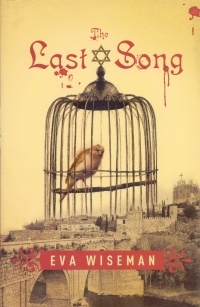| ________________
CM . . . . Volume XVIII Number 23 . . . . February 17, 2012
excerpt:
Isabel de Cardosa is the 15-year-old daughter of the well-respected physician to Queen Isabella and King Ferdinand of the Spain that is mired in the Inquisition of the 16th century. In order to keep Isabel safe from suspicion and religious persecution, her father betroths her to Luis de Carrera, the spoiled and vicious son of their majesty’s closest advisor. Isabel’s parents reveal to her that they are actually Converso, of Jewish ancestry, their parents having embraced the Roman Catholic faith in order to escape torture and death at the hands of the Church. As the marriage trap closes inexorably on Isabel, she begins to feel like the caged songbird that her father brought to her from the Alhambra Palace in the Kingdom of Granada where Spain’s armies had defeated the Moors and driven them out of Spain. But then Isabel makes the acquaintance of Yonah, the Jewish silversmith, who creates a beautiful caged golden bird for a centerpiece in the de Cardosa home. Gradually, she finds herself secretly drawn into the Jewish faith and customs, aligning herself with Yonah and his family as she avoids the loutish Luis. After using the Jewish community’s gold in the conquest of the Moors, Ferdinand and Isabella betray them by expelling the Jews from Spain, under pain of death if they refuse to leave. The cold and threatening head of the Inquisition, Tomas de Torquemada, has Isabel’s father, Don Enrique, arrested. But when Isabel shows the evil man a copy of a letter that proves that Don Enrique and Torquemada are cousins, a letter that would expose Torquemada as a member of a Converso family and a traitor, Don Enrique is released. Yonah and his family immediately hide Isabel and her family until they can escape from the furious Torquemada. Undergoing much hardship, betrayal and danger, the Jewish group walks to the port of Cartagena where they board the Santa Maria, heading for a new home in Morocco. Isabel is a delightful character, proper and wealthy, caught up in the intricacies of her privileged life. Gradually, she begins to question her father’s fear of the Inquisition, the beliefs of her beloved Church and the loyalty of her best friend’s family. Her deep love for her parents sustains her, but it is in Yonah’s steady, comforting and respectful love that she finds the inspiration and courage to save her family and to leave her homeland. Secondary characters, from Isabel’s friendly maid Sofia and the head of the household’s servants, the loyal Yussuf, to Isabel’s parents and the evil Torquemada are alive in their own right, capably moving along the plot and exposing this terrifying time to today’s students. The impotent position of Isabel’s mother, bewildered by the treachery surrounding her and terrified of being discovered as a closet Jew, is telling. Don Enrique’s position as a powerful man at court and at home paints a picture of the domination of men who controlled all economic and social situations. Although he, too, is fearful, he prepares a plan, and he never gives up hope, expecting almost to the end that his alliance with the de Carrera’s will protect him and his family. Although it is Isabel who has really engineered their escape, Don Enrique takes charge and marshals his family toward freedom.
Highly Recommended. Joan Marshall is a Winnipeg, MB, bookseller.
To comment
on this title or this review, send mail to cm@umanitoba.ca.
Copyright © the Manitoba Library Association. Reproduction for personal
use is permitted only if this copyright notice is maintained. Any
other reproduction is prohibited without permission.
NEXT REVIEW |
TABLE OF CONTENTS FOR THIS ISSUE
- February 17, 2012.
AUTHORS |
TITLES |
MEDIA REVIEWS |
PROFILES |
BACK ISSUES |
SEARCH |
CMARCHIVE |
HOME |
||||||
